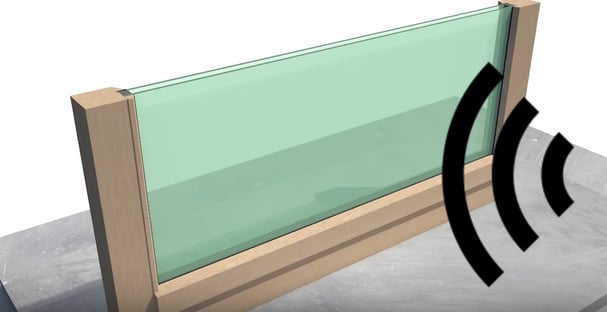Want to know how to soundproof windows so you won’t have to experience your neighbour’s passion for electronic dance music or the screeching urgency of the nearby subway train ever again?
This isn’t window soundproofing like your grandfather used to use. It doesn’t involve attaching material to the existing window or hanging heavy drapes to try and muffle the sound.
This is modern glazing and joinery technology – efficient, remarkably simple and powerful enough that you’ll actually start sleeping in on weekends because you’ll never hear the garbage collection truck rumbling through the streets on Saturday morning.
A lot of people don’t realise just how much of a difference professional soundproofing can make. Whether you’re looking for a solution to the heavy noise pollution of airports or train tracks, or you’re on a mission to find out how to soundproof a window from traffic noise and late night neighbours, you’re probably going to be disappointed with the results of most DIY soundproofing jobs.

With the right product selection, however, you can create the serene interior you deserve.
You can even have your existing windows soundproofed – which means you won’t have to pay a high price to have new double glazed windows installed.
Even better, you’ll be able to retain the original character of your current windows.
Sounds too good to be true, doesn’t it?
It’s actually the opposite – too practical to dismiss.
Find out what the industry experts know about ways to soundproof glass windows and see if the latest advancements in glass insulation may be the perfect answer for your noisy problems.
The Truth about Sound and Your Windows
The fact is, a lot of the materials property owners try to use to dampen sound aren’t that effective.

Even attaching an acrylic or glass pane over the inside of your existing window is only going to make a moderate difference. This is because sound can still easily penetrate standard glass.
In order to achieve a quiet room, you’ll need a decibel level between 20 and 40 db. Something as common as a loud car horn of a vehicle passing by increases the sound level to 100 dB.
To give you a frame of reference for the difference between ‘quiet’ and ‘annoyingly loud,’ it’s important to understand the basics of how sound is measured.
Noise, which is measured in terms of the sound pressure level, isn’t measured on a linear scale. This means those 100 dB from a car horn aren’t just louder, they’re exponentially louder.
For example:
An average conversation has a sound level of 60 dB. 100 dB is 16 times as loud. 110 dB, the sound level of a night club, is 32 times as loud!
Gradual hearing loss begins with prolonged exposure to 85 dB and up. Heavy, nearby traffic comes in at 90 decibels, which means a lot of people living in urban areas are exposed to unhealthy levels of sound.
What industry professionals know is that you have to have the right combination of glass thickness, air space thickness and type of glass to achieve the desired sound insulating effect.
The Double Glazing Soundproof Difference
Professionals use double glazing to effectively soundproof a property. With double glazing, an insulated glass unit (IGU) is installed. It consists of two panes of glass, separated by an air space.
This combination of two separate panes of glass and the air space in between is the best window soundproofing solution – by far.
Most people assume double glazing has to entail a full window replacement, along with the sizable investment that comes with such a job.
With today’s window design and installation technology, property owners have more options. With new double glazed windows, you will get a full window replacement – with a new frame, the IGU and often an altered aesthetic that doesn’t look right.
Retrofit double glazing is a little different and a lot less expensive. Instead of ripping out your current windows and installing new ones, your existing timber windows are converted. The current frame remains, only a new IGU is put in.
How Professionals Evaluate a Property for Window Soundproofing

When a professional comes to a home or building they are going to take an in-depth look at the noise reduction needs of each room. There’s a lot more to creating an acoustic haven than just finding ways to dampen sound waves.
They’ll assess the nature of the sound as well as the property, looking at the following factors:
- What is the sound level in decibels of the source of the noise pollution? This will vary for different areas of your home. For example, windows in areas affected by traffic could require a different solution than back room windows overlooking a garden.
- What is the frequency of the sound? How high or low the pitch is will impact how effective your soundproofed windows will be. For example, with a low-frequency sound, around 500 Hz, you’ll get about 24 dB of sound transmission loss with a basic insulated glass unit. For 2000 Hz, a higher pitch, the sound transmission loss will be 44 dB.
- How regular is the sound? Whether a noise is intermittent or constant will impact the soundproofing needs of your property. For example, you’re going to need better sound insulation with your glass to protect against hearing damage in cases where you have an incessant stream of noise pollution, such as rush hour traffic every morning and evening.
- What type of windows are currently in place? As long as you have existing timber windows, you’ll be able to use a retrofit double glazing system instead of new double glazed windows.
With retrofitting, you’ll pay about one-third of the cost of new windows. And, you won’t have to sacrifice your property’s unique charm because the original frame, style and design is preserved.
Thermawood also uses a patented dry retrofit double glazing system so you won’t have to worry about moisture build-up and future mould growth. This can be an issue with other double glazing systems.
Customising Your Window Soundproofing
Once a property is evaluated, a professional will determine the best type and thickness of glass to use for the IGUs on a room by room basis. The goal is to reduce the decibel level enough to suit the needs of each room and the characteristics of the noise pollution affecting the room.
A soundproofing expert may recommend one or two of the glass panes in an IGU to be acoustic glass for soundproofing a front window from loud traffic noise. Kitchen windows that face the backyard may only need to have standard float glass.
Another way to customise your double glazing soundproofing is to use laminate or acoustic-grade glass. Both of these types of glass are significantly more effective at blocking out noise than standard glass.
Laminated glass is made of two layers of glass with an interlayer sandwiched in between. Acoustic glass contains a specific acoustic resin in between two layers of glass.
Is Professional Double Glazing the Best Option for Noise Reduction?
If you want to achieve quiet and tranquillity in your home or building, nothing compares to double glazing. As long as you currently have wooden windows, you can take advantage of the seamless transition and lower cost of retrofit double glazing instead of new double glazed windows.
You can also tailor your soundproofed windows to suit each room. A professional can help you get the perfect calm for your home or building, while also helping you stay within budget by only using thicker glass panes or specialised glass in rooms where you need the extra acoustic boost.

[Free Guide]
Learn All About Reducing
the Noise Entering Your Home
or Building

![How to Soundproof Windows [What the Pro’s Know]](https://www.thermawood.co.nz/wp-content/uploads/2020/08/how-to-soundproof-windows.png)
